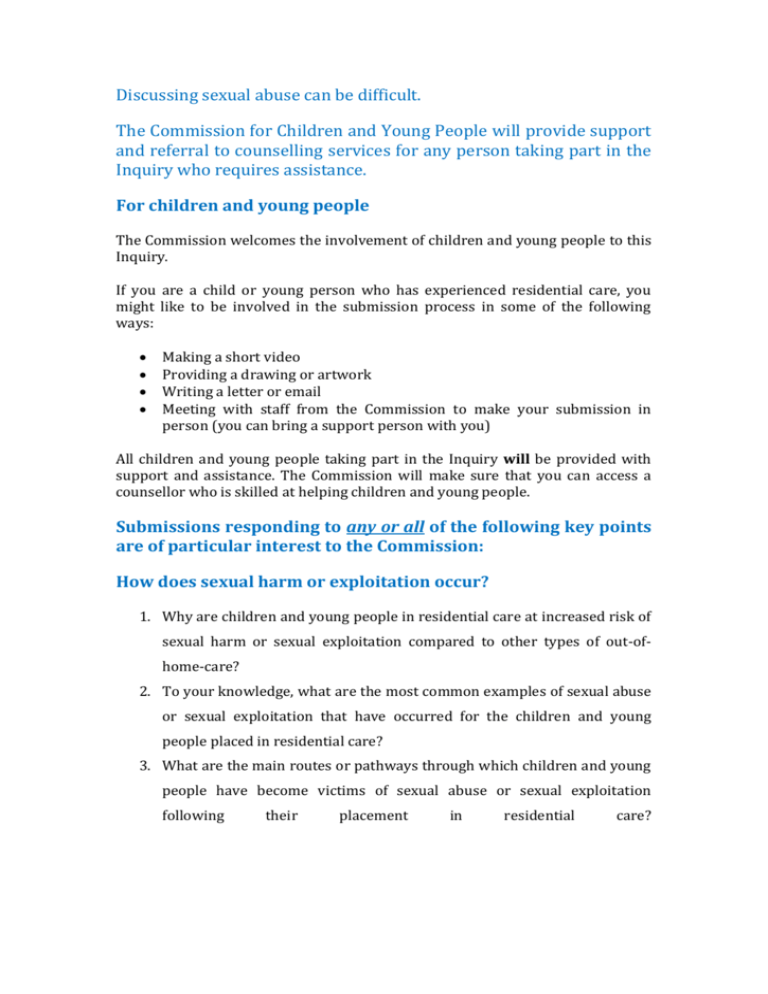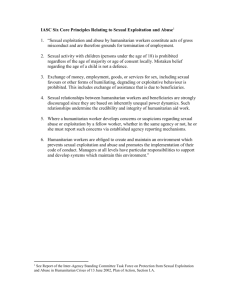
Discussing sexual abuse can be difficult.
The Commission for Children and Young People will provide support
and referral to counselling services for any person taking part in the
Inquiry who requires assistance.
For children and young people
The Commission welcomes the involvement of children and young people to this
Inquiry.
If you are a child or young person who has experienced residential care, you
might like to be involved in the submission process in some of the following
ways:
Making a short video
Providing a drawing or artwork
Writing a letter or email
Meeting with staff from the Commission to make your submission in
person (you can bring a support person with you)
All children and young people taking part in the Inquiry will be provided with
support and assistance. The Commission will make sure that you can access a
counsellor who is skilled at helping children and young people.
Submissions responding to any or all of the following key points
are of particular interest to the Commission:
How does sexual harm or exploitation occur?
1. Why are children and young people in residential care at increased risk of
sexual harm or sexual exploitation compared to other types of out-ofhome-care?
2. To your knowledge, what are the most common examples of sexual abuse
or sexual exploitation that have occurred for the children and young
people placed in residential care?
3. What are the main routes or pathways through which children and young
people have become victims of sexual abuse or sexual exploitation
following
their
placement
in
residential
care?
What are the responses for children and young people?
4. What is the standard response to an incident of sexual abuse or sexual
exploitation of a child or young person residing in residential care? Can
you offer any comments about the adequacy of the response and
associated service systems? Is there consistency in the response? If not,
what are the factors that result in variability?
5. How can children and young people be better protected from sexual harm
or sexual exploitation in residential care?
6. How adequately are the health needs, education, community and family
connections of children and young people met in residential care? Are
there ways these connections and needs could be better addressed or
improved for children and young people in residential care?
7. What are the policies and common practices in residential units regarding
the children and young persons’ use of mobile phones, internet, social
media and technology?
8. What form of sexual health education and relationship education is
provided to children and young people in residential care, if any? Who
provides this education and are their skills, training, supervision and
support adequate to perform this role? How formalised is the
delivery/content/approach/evaluation?
How
does
this
education
integrate with what is provided to children and young people in their
formal education at school, for those children and young people who
attend school?
What would make a difference?
9. What changes would be most helpful in preventing children and young
people in residential care becoming a victim of sexual abuse or sexual
exploitation and in helping them to escape from it?
10. Do staff who care for and work with these children and young people
have adequate skills, training, supervision and support to respond to,
manage and prevent children and young people in residential care from
being exposed to or becoming a victim of sexual abuse or sexual
exploitation? Are there any improvements that could be made in this
area?
11. How well do the service systems presently work together to prevent,
respond to and support children and young people who have been a
victim of sexual abuse or sexual exploitation in residential care? Are there
ways the service systems could work differently to improve outcomes for
these children?
12. Any other matters or issues that you feel the Commission should consider
in its Inquiry.





